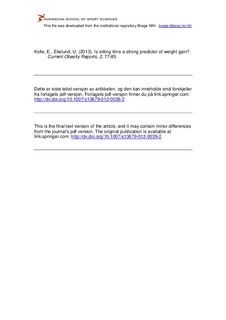| dc.contributor.author | Kolle, Elin | |
| dc.contributor.author | Ekelund, Ulf | |
| dc.date.accessioned | 2014-11-03T13:25:04Z | |
| dc.date.available | 2014-11-03T13:25:04Z | |
| dc.date.issued | 2012-12-09 | |
| dc.identifier.citation | Current Obesity Reports. 2013, 2, 77-85 | nb_NO |
| dc.identifier.uri | http://hdl.handle.net/11250/225307 | |
| dc.description | I Brage finner du siste tekst-versjon av artikkelen, og den kan inneholde ubetydelige forskjeller fra forlagets pdf-versjon. Forlagets pdf-versjon finner du på link.springer.com: http://dx.doi.org/10.1007/s13679-012-0039-2 / In Brage you'll find the final text version of the article, and it may contain insignificant differences from the journal's pdf version. The original publication is available at link.springer.com: http://dx.doi.org/10.1007/s13679-012-0039-2 | nb_NO |
| dc.description.abstract | The current review aimed to examine the evidence on prospective associations between sedentary behavior (i.e., sitting time) and weight gain. Prospective studies published between January 2010 and August 2012 were identified from searches in the Medline databases. In total 13 studies (seven in adolescents and six in adults) examining the prospective association between sedentary behavior and any measure of weight gain met inclusion criteria. In adolescents, mixed evidence was observed for a positive association between sedentary behavior at baseline and weight gain at follow-up. In adults, there was insufficient evidence that sedentary time at baseline was a strong predictor of weight gain at follow-up. The majority of the included studies used self- or parent-reported sedentary time which can be affected by social desirability and recall bias. Marked heterogeneity in study populations, exposure and outcome measures precluded a quantitative meta-analysis. Failure to appropriately adjust the results for baseline measures of the outcome particularly in the studies in children and adolescents may partly explain the observations. Therefore, firm conclusions whether prolonged sitting time predict weight gain in young people and adults is currently not possible. High-quality studies using repeated objective measures of sedentary behavior is warranted to establish a causal association. | nb_NO |
| dc.language.iso | eng | nb_NO |
| dc.publisher | Springer Verlag | nb_NO |
| dc.subject | sedentary behavior | nb_NO |
| dc.subject | sitting | nb_NO |
| dc.subject | longitudinal studies | nb_NO |
| dc.subject | weight gain | nb_NO |
| dc.subject | adult | nb_NO |
| dc.subject | youth | nb_NO |
| dc.subject | obesity | nb_NO |
| dc.subject | overweight | nb_NO |
| dc.title | Is sitting time a strong predictor of weight gain? | nb_NO |
| dc.type | Journal article | nb_NO |
| dc.type | Peer reviewed | nb_NO |
| dc.subject.nsi | VDP::Medical disciplines: 700::Health sciences: 800::Nutrition: 811 | nb_NO |
| dc.source.journal | Current Obesity Reports | nb_NO |
| dc.description.localcode | Seksjon for idrettsmedisinske fag / Department of Sports Medicine | nb_NO |
